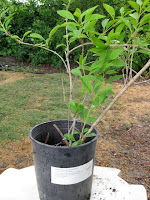You may have noticed that more and more retailers as well as manufacturers have expanded their digital advertising. No longer is an e-mail blast the sole digital component of communication between a nursery and its customers. My goodness, who doesn't have a presence on Facebook or Twitter in 2010?
However, there is a dangerous trend in this: many large garden retailers and product manufacturers have outsourced their digital PR work to outside firms; or, to employees who know their way around a computer better than the product aisles.
For example, one large, California-based garden center sent this Tweet out to their followers last week:
"Garden Tip: Do you have bug problems in your garden? Try Sevin Insect Control. It's OK to use on edibles and is environmentally-friendly."
Whoa, Nellie.
"ENVIRONMENTAL HAZARDS
This product is extremely toxic to aquatic and estuarine invertebrates. Do not apply directly to water, or to areas where surface water is present or to intertidal areas below the mean high water mark. Do not contaminate water by cleaning of equipment or disposal of wastes.
BEE CAUTION
This product is highly toxic to bees exposed to direct treatment on blooming crops or weeds. Do not apply this product or allow it to drift to blooming crops or weeds
while bees are actively visiting the treatment area.
VEGETABLE CROPS
For control of all the vegetable pests listed below, apply this product in adequate volume to effectively cover both the upper and lower surfaces of the plant. NOTE: This
product is not registered for use on celery and sweet potatoes in California."
The label goes on to state to wait 14 days after use before harvesting Broccoli, Brussels sprouts, Cabbage, Cauliflower, Chinese Cabbage, Kohlrabi, Celery, Collards, Endive (Escarole), Hanover salads, Head lettuce, Kale, Leaf lettuce, Mustard greens, Parsley, Salsify roots, Spinach, Swiss chard,
Turnip tops and Peanuts. Oh, wait a minute: it's not registered for use on Celery in California. Nevermind.
This is the back side of the label. The front side of the Sevin Insect Control label says nothing about being "environmentally friendly" or "OK to use on edibles". And there's a good reason for that: product labels for pesticides are legal documents, binding in a court of law.
And this is why we repeat the mantra, over and over: READ AND FOLLOW ALL LABEL DIRECTIONS.
If you attempted to take the manufacturer or retailer to court because, all of sudden, after using their product, the bees in your yard were found dead, your chances of winning would be minimal. Especially if your defense was, "Their advertising said it was 'environmentally friendly'".
As Trey Pitzenberger, Owner of the Golden Gecko Nursery in Garden Valley, CA pointed out in the April 9th edition of his blog on this topic: " I suppose a vegetable garden sprayed with Sevin is more environmentally friendly than that same area covered in concrete." Chimed in nursery owner Don Shor of Redwood Barn Nursery in Davis: "When carbaryl was introduced in 1956, it WAS environmentally friendly... Compared to DDT."
Again, this was a retailer (or the retailer's agent) making those claims of "environmentally safe", not the manufacturer. It is imperative that you, the home gardener, READ THE LABEL.
==========================================
A blast from another PR agency touted:
"A Green Revolution is sweeping the country. Now, more than ever, people are concerned about safety in and around the home landscape. They are concerned about the food they are eating, where it’s coming from, and about the products used to grow them and it’s not just in the garden where homeowners are concerned. Lawn care, flowerbeds and landscaping are getting attention too.
For many of us, our lawns and gardens are a source of enjoyment. Our children play on them, we entertain our friends in them and many times, they are the source of the fresh fruits and vegetables we put on our table to share with family and friends.
Sadly, our lawns and gardens, specifically the maintenance of them, can be hazardous to the environment. The average suburban lawn can use up to six times the hazardous chemicals per acre as conventional farming and a gas mower can emit 10 times as much hydrocarbon as a car in one hour of use.
As we become more aware of the damage that is being done to the environment around us, a trend of conscious gardening has emerged."
Ooh, sounds good! Um, exactly what product are you attempting to sell?
..."Products like Clear Choice which used 80% less chemicals effectively kills weeds –right down to the root."
Well, the front label is promising: "Lawn Friendly Weed Remover". But what's that below, in the smaller print?
"Active Ingredients:
2,4-D, dimethylamine salt* 0.0340%
Mecoprop-p, dimethylamine salt** 0.0220%
Dicamba, dimethylamine salt*** 0.0042%"
"...combines 3 active ingredients and controls most broadleaves (weak on oxalis); dicamba products may kill ornamentals if roots are in lawn or drift occurs."
And sure enough, a closer look at the backside of the product label reveals:
"ENVIRONMENTAL HAZARDS
This pesticide is toxic to fish and aquatic invertebrates. This product may adversely affect non-target plants. Do not apply to or near water, storm drains, gutters, sewers, or drainage ditches. Do not apply to areas where surface water is present, or to intertidal areas below the mean high water mark, except as noted on appropriate labels. Do not apply within 25 feet of rivers, fish ponds, lakes, streams, reservoirs, marshes, estuaries, bays, and oceans. Drift and runoff may be hazardous to aquatic organisms in water adjacent to treated areas, and to non-target plants. Do not apply when windy. To prevent product run-off, do not water to the point of runoff, or apply when raining or when rain is expected that day."
But wait, there's more:
"GENERAL PRECAUTIONS AND RESTRICTIONS
• Do not apply this product in a way that will contact any person or pet, either directly or through drift. Keep people and pets out of the area during application.
• Do not allow people or pets to enter the treated area until sprays have dried.
• Do not apply near lakes, streams, rivers or ponds.
• Avoid drift of spray mist onto vegetables, flowers, ornamental plants, shrubs, trees and other desirable plants. Do not apply in windy conditions.
• Do not apply as a fine mist because of potential injury to desirable plants."
Again, it is up to you to figure out what's best for your yard.
Be skeptical of the advertising hype. Instead...
READ AND FOLLOW ALL LABEL DIRECTIONS.
 or the National Garden Book (if you can still find them!)
or the National Garden Book (if you can still find them!) 










